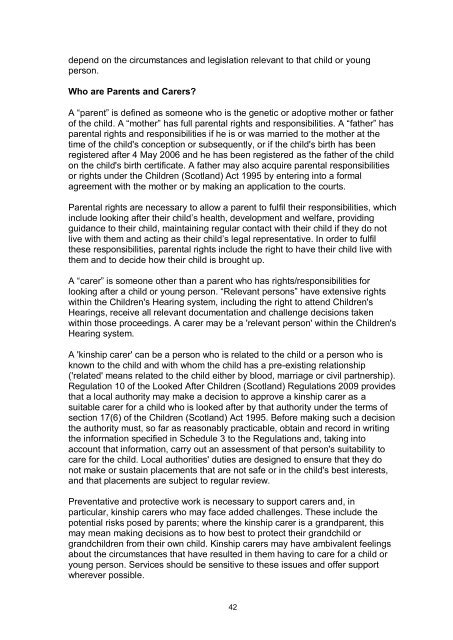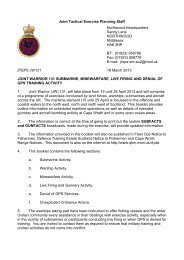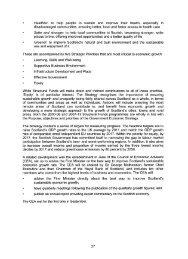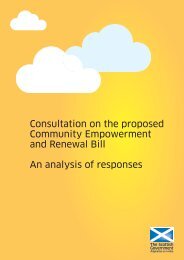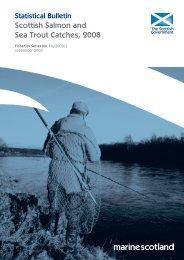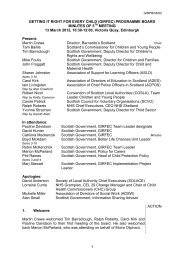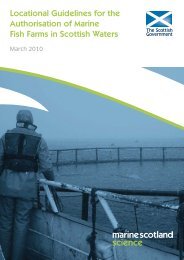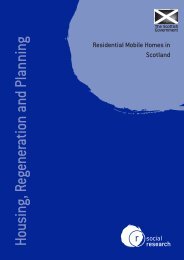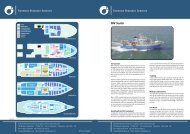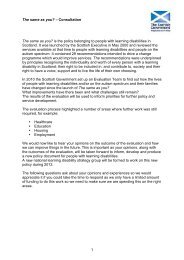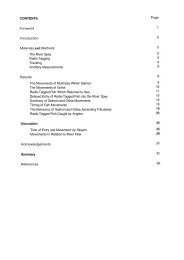National guidance for child protection in Scotland - Scottish ...
National guidance for child protection in Scotland - Scottish ...
National guidance for child protection in Scotland - Scottish ...
Create successful ePaper yourself
Turn your PDF publications into a flip-book with our unique Google optimized e-Paper software.
depend on the circumstances and legislation relevant to that <strong>child</strong> or young<br />
person.<br />
Who are Parents and Carers?<br />
A “parent” is def<strong>in</strong>ed as someone who is the genetic or adoptive mother or father<br />
of the <strong>child</strong>. A “mother” has full parental rights and responsibilities. A “father” has<br />
parental rights and responsibilities if he is or was married to the mother at the<br />
time of the <strong>child</strong>'s conception or subsequently, or if the <strong>child</strong>'s birth has been<br />
registered after 4 May 2006 and he has been registered as the father of the <strong>child</strong><br />
on the <strong>child</strong>'s birth certificate. A father may also acquire parental responsibilities<br />
or rights under the Children (<strong>Scotland</strong>) Act 1995 by enter<strong>in</strong>g <strong>in</strong>to a <strong>for</strong>mal<br />
agreement with the mother or by mak<strong>in</strong>g an application to the courts.<br />
Parental rights are necessary to allow a parent to fulfil their responsibilities, which<br />
<strong>in</strong>clude look<strong>in</strong>g after their <strong>child</strong>’s health, development and welfare, provid<strong>in</strong>g<br />
<strong>guidance</strong> to their <strong>child</strong>, ma<strong>in</strong>ta<strong>in</strong><strong>in</strong>g regular contact with their <strong>child</strong> if they do not<br />
live with them and act<strong>in</strong>g as their <strong>child</strong>’s legal representative. In order to fulfil<br />
these responsibilities, parental rights <strong>in</strong>clude the right to have their <strong>child</strong> live with<br />
them and to decide how their <strong>child</strong> is brought up.<br />
A “carer” is someone other than a parent who has rights/responsibilities <strong>for</strong><br />
look<strong>in</strong>g after a <strong>child</strong> or young person. “Relevant persons” have extensive rights<br />
with<strong>in</strong> the Children's Hear<strong>in</strong>g system, <strong>in</strong>clud<strong>in</strong>g the right to attend Children's<br />
Hear<strong>in</strong>gs, receive all relevant documentation and challenge decisions taken<br />
with<strong>in</strong> those proceed<strong>in</strong>gs. A carer may be a 'relevant person' with<strong>in</strong> the Children's<br />
Hear<strong>in</strong>g system.<br />
A 'k<strong>in</strong>ship carer' can be a person who is related to the <strong>child</strong> or a person who is<br />
known to the <strong>child</strong> and with whom the <strong>child</strong> has a pre-exist<strong>in</strong>g relationship<br />
('related' means related to the <strong>child</strong> either by blood, marriage or civil partnership).<br />
Regulation 10 of the Looked After Children (<strong>Scotland</strong>) Regulations 2009 provides<br />
that a local authority may make a decision to approve a k<strong>in</strong>ship carer as a<br />
suitable carer <strong>for</strong> a <strong>child</strong> who is looked after by that authority under the terms of<br />
section 17(6) of the Children (<strong>Scotland</strong>) Act 1995. Be<strong>for</strong>e mak<strong>in</strong>g such a decision<br />
the authority must, so far as reasonably practicable, obta<strong>in</strong> and record <strong>in</strong> writ<strong>in</strong>g<br />
the <strong>in</strong><strong>for</strong>mation specified <strong>in</strong> Schedule 3 to the Regulations and, tak<strong>in</strong>g <strong>in</strong>to<br />
account that <strong>in</strong><strong>for</strong>mation, carry out an assessment of that person's suitability to<br />
care <strong>for</strong> the <strong>child</strong>. Local authorities' duties are designed to ensure that they do<br />
not make or susta<strong>in</strong> placements that are not safe or <strong>in</strong> the <strong>child</strong>'s best <strong>in</strong>terests,<br />
and that placements are subject to regular review.<br />
Preventative and protective work is necessary to support carers and, <strong>in</strong><br />
particular, k<strong>in</strong>ship carers who may face added challenges. These <strong>in</strong>clude the<br />
potential risks posed by parents; where the k<strong>in</strong>ship carer is a grandparent, this<br />
may mean mak<strong>in</strong>g decisions as to how best to protect their grand<strong>child</strong> or<br />
grand<strong>child</strong>ren from their own <strong>child</strong>. K<strong>in</strong>ship carers may have ambivalent feel<strong>in</strong>gs<br />
about the circumstances that have resulted <strong>in</strong> them hav<strong>in</strong>g to care <strong>for</strong> a <strong>child</strong> or<br />
young person. Services should be sensitive to these issues and offer support<br />
wherever possible.<br />
42


